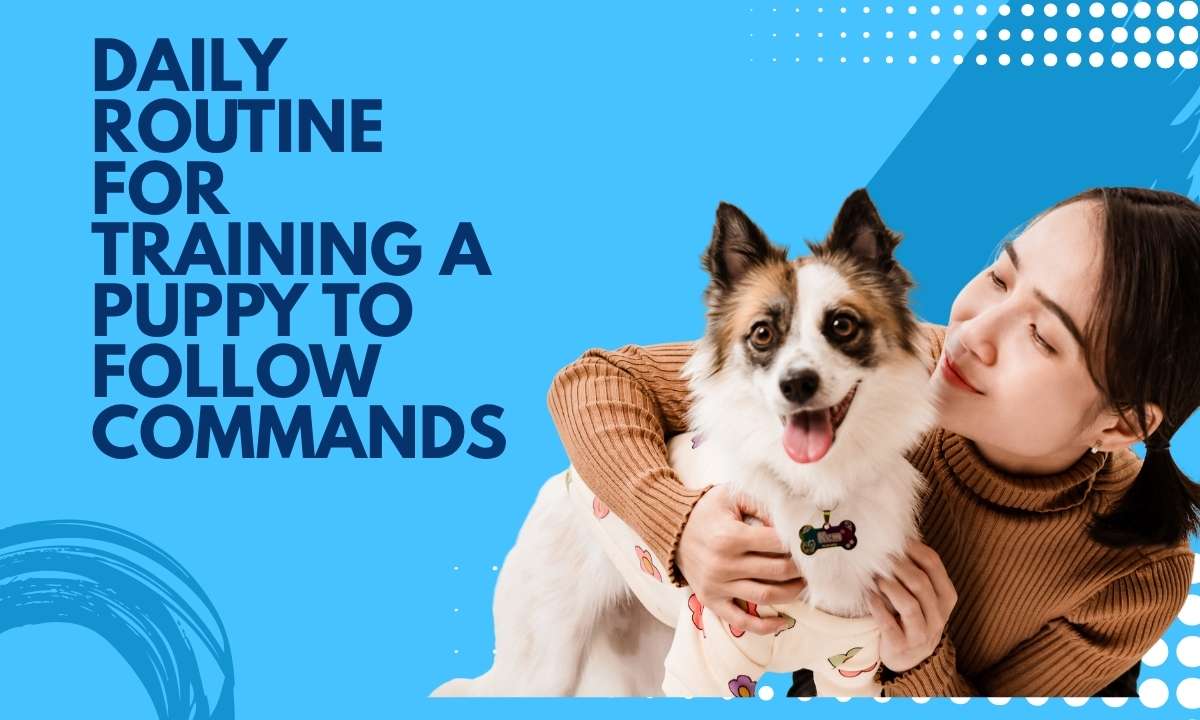Training a puppy to follow commands requires consistency, patience, and a structured daily routine. Puppies are highly impressionable during their first months, and establishing a clear training schedule ensures that they develop obedience, confidence, and good behavior. A daily routine not only helps your puppy learn faster but also fosters a sense of security and predictability. By integrating basic commands, socialization, crate training, and positive reinforcement into your day, you can raise a disciplined, well-behaved, and happy companion.
Morning Routine: Start the Day with Focus
The day should begin with calm and structured activities that set the tone for training. Start by taking your puppy outside for a bathroom break, which establishes consistency and reinforces housebreaking. Afterward, dedicate a few minutes to practicing basic commands such as “sit,” “come,” and “stay.” Using positive reinforcement like praise and treats during these short sessions helps your puppy focus and associate obedience with rewards. Starting the morning with structured interactions encourages attentiveness and prepares your puppy for learning throughout the day.
Mid-Morning: Socialization and Exploration
After basic command practice, mid-morning is a great time for supervised socialization and controlled exploration. Allow your puppy to interact with other dogs, family members, or safe new environments. These experiences help your puppy develop confidence and adaptability while reinforcing calm and polite behavior. While exploring, continue reinforcing commands by asking your puppy to “sit” or “stay” before interacting with new stimuli. Gradually exposing your puppy to varied experiences strengthens their responsiveness and teaches them to remain composed in different situations.
Late Morning: Short Training Sessions
Late morning is ideal for focused training sessions to introduce new commands or reinforce existing ones. Puppies have limited attention spans, so keeping sessions brief and positive is key. This is the time to work on recall, leash walking, or other obedience skills that require concentration. Reward your puppy consistently for correct behavior and avoid showing frustration if mistakes occur. These sessions help your puppy internalize commands and understand expectations while maintaining a positive and enjoyable learning experience.
Afternoon: Rest and Quiet Time
Puppies need adequate rest to process new information and maintain overall health. After a morning of training and socialization, provide a period of quiet time or a nap in a safe space, such as a crate or designated sleeping area. This rest period not only prevents overstimulation but also reinforces crate training and independence. A well-rested puppy is more receptive to learning and less likely to exhibit hyperactive or destructive behaviors during subsequent training sessions.
Early Evening: Reinforcing Basic Commands
Early evening is an excellent opportunity to reinforce commands learned earlier in the day. Use mealtime as a practical way to practice obedience, such as asking your puppy to “sit” and “wait” before receiving food. Short, structured training sessions in familiar environments help strengthen retention and reliability. By consistently reinforcing basic commands at different times of the day, your puppy learns that obedience is expected in various contexts, which builds discipline and self-control.
Evening Walks and Controlled Play
Evening walks and play sessions provide both physical exercise and training opportunities. During walks, practice leash manners, recall, and polite greeting behavior with other dogs or people. Structured play allows your puppy to expend energy while practicing impulse control, such as waiting for a toy release cue. Combining exercise with obedience practice ensures that your puppy remains calm, responsive, and well-mannered while meeting their physical and mental needs.
Nighttime Routine: Wind Down and Crate Training
As the day comes to an end, establish a nighttime routine that encourages calmness and reinforces crate training. A final bathroom break should be followed by quiet, gentle interaction, such as petting or soft praise. Encourage your puppy to settle in their crate or designated sleeping area, creating a sense of security. Gradually increasing the duration of crate time overnight helps your puppy develop independence and reduces anxiety when left alone. A predictable nighttime routine reinforces discipline and prepares your puppy for restful sleep.
Consistency and Long-Term Reinforcement
The key to successfully training a puppy to follow commands lies in consistent daily routines. Every activity, from morning training sessions to evening walks and nighttime settling, should reinforce learned behaviors and expectations. Puppies thrive on predictability, and regular reinforcement ensures that commands become second nature. Over time, consistent routines build a calm, disciplined, and obedient dog capable of responding reliably in different situations. Positive reinforcement, patience, and structured guidance are essential for long-term success.
Conclusion
Creating a daily routine for training a puppy to follow commands is essential for raising a disciplined, confident, and well-behaved dog. By integrating morning command practice, socialization, focused training sessions, rest periods, reinforcement opportunities, structured walks, and nighttime routines, you provide your puppy with the consistency and guidance they need to succeed. Following this step-by-step daily schedule ensures that your puppy develops obedience, self-control, and good manners, forming the foundation for a lifelong bond with a happy and well-adjusted companion.

